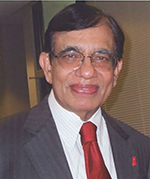
Cancer: What’s the Answer? Part VII New treatments

What was considered a deadly disease once, cancer, is now becoming a malady that can be controlled and even cured with new therapies. As per Dr. Raju Rao, an experienced practicing oncologist in Hernando County, “Recent advances in the treatment of malignancies include molecular and genetic testing of the tumor and the resulting uniqueness thus recognized of the behavior of cancer in a patient. This information then can be applied toward specific targeted agents and immune therapies that result in a more predictable response and in many cases, lesser side effects. Better quality of life and survival is the end result.”
That is reassuring. A case in point is that of a 74-year-old friend of mine, Mr. Devan (not his real name) primarily a vegetarian, non-smoker and non-drinker who was diagnosed with cancer of the lung. He was devastated and didn’t know if this was how life was going to end. But with good care from MD Anderson Hospital in Houston that included surgical excision of the tumor, radiotherapy, chemotherapy and the new immunotherapy, he recovered and lived for many more years.
Finally, we are winning the “war on cancer.” The National Cancer Act, signed into law in 1971, has had a long-lasting impact on the approaches to prevent, diagnose, study, treat and cure cancer. For people like Devan, cancer had become a chronic disease like heart disease or kidney disease that could be kept under control with modern therapies. As one oncologist put it, “In the past, I dreaded telling the patient, ‘Sorry to inform you that you have cancer. We will do the best we can’… Now I tell them, ‘Yes, you do have cancer but don’t get too worried. With the new treatments I am going to start, we can keep it under control, so you can continue to live your life.’ ”
What are these new therapies revolutionizing cancer treatment? One of the most important advances is deciphering the hidden universe of cancer genetics and sequencing the cancer genome. This has helped us to develop two new kinds of treatments – ‘Immunotherapy’ and ‘Targeted therapy’ – true game changers in the field.
The immune system is intended to defend our body from outside enemies. This translates into helping our body fight infections and other diseases that invade the body. Immunotherapy harnesses our own immune system to fight the cancer. It does so in one of two ways: 1. Use of a drug that can ‘stimulate or boost the natural defense of your immune system to make it work harder and smarter to find the cancer cells, attack them and destroy them.’ 2. Developing specific drugs in the lab that are ‘just like immune system components and using them to help restore or improve the immune system so it can find and attack cancer cells.’
Targeted therapy uses drugs or other substances to precisely identify and attack certain types of cancer cells. It can be used by itself or in combination with other treatments, such as traditional or standard chemotherapy, surgery or radiation therapy. These drugs specifically look for its mark, which is the cancer cell, then attach on to them, block their growth and spread by interfering with specific molecules within the cells – molecular targets – that are aiding the growth, progression and spread of cancer cells and then, attack and destroy them. Some of the monoclonal antibodies in current-day use are considered targeted therapy. Many cancers like breast cancers, colorectal cancers, leukemias, etc., can be treated with this treatment. Targeted therapies are also called “precision medicines” because of the precise nature of this treatment, one of the great advances in cancer therapies. Unlike standard chemotherapy that kills the tumor cells and also some of the normal cells, targeted therapy can block tumor cell proliferation – an important consideration in treating tumors. They can also inhibit formation of new blood vessels in the tumors (angiogenesis,) a key factor in their growth. Already, there are many drugs in this category in use and more are being developed.
Thanks to these fascinating new treatments, we can fight cancer with knowledge, hope and optimism and patients can expect to live longer. And don’t forget the basic elements in the prevention and management of cancer such as low-fat diet, regular exercise, abstinence from smoking and stress reduction.
M.P. Ravindra Nathan, M.D., is a cardiologist and Emeritus Editor of AAPI Journal. For further reading, “Second Chance - A Sister’s Act of Love” by Dr. Nathan from Outskirts Press, can be found at www.amazon.com